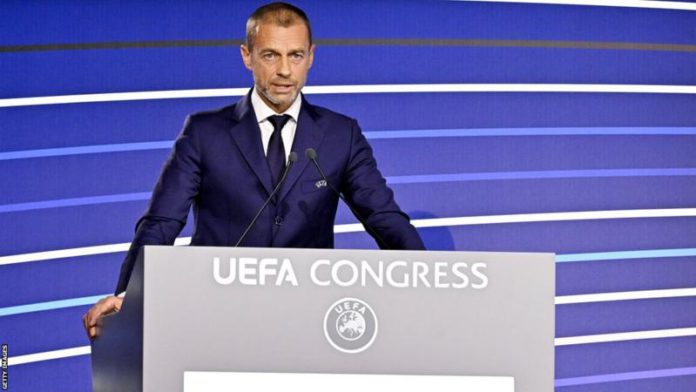Uefa president Aleksander Ceferin says he will not seek re-election in 2027.
It comes after Uefa voted to change its rules, which would have allowed the 56-year-old Slovenian to run again and potentially stay at the helm of European football’s governing body until 2031.
The English Football Association (FA) was the only nation to oppose the rule amendment at a Uefa congress in Paris.
The FA said leaders should serve a “maximum” of three terms of four years.
Previous rules allowed a president to serve three terms in office but the new ruling means Ceferin’s initial term, when he replaced Michel Platini in 2016 part-way through a four-year cycle, does not count as a full term served.
Ceferin took over when Platini stepped down in May 2016 after being banned by world governing body Fifa over ethics breaches.
Despite a two-thirds majority of 49 nations voting to pass the motion, he later announced he would not stand in 2027.
Ceferin told a news conference: “I decided six months ago that I would not run any more. The reason is that after some time every organisation needs fresh blood, but mainly because I was away from my family for seven years now.
“I intentionally didn’t want to disclose my thoughts before, because firstly, I wanted to see the real face of some people and I saw it.”
Opponents of the motion – including FA chief executive Mark Bullingham – argued the change goes against the pledge Ceferin made to preside over cleaner corporate governance of Uefa when he took over from Platini.
Uefa general secretary Theodore Theodoridis said Ceferin’s decision not to tell the national associations of his plans beforehand was not an embarrassment for the FA.
“I don’t think so,” he said. “We have a democracy.”
The change is seen as a controversial one and Uefa’s technical director Zvonimir Boban quit his role in January in protest at Ceferin’s presumed intention to stay on for a further term, calling the move “beyond comprehension”.
Ceferin responded to this after making his announcement, saying Boban was aware he would not seek re-election and called his stance a “pathetic cry”.
“He could not wait because after my disclosure, his whining would not make sense,” Ceferin added.
Other statute changes, including the requirement to have at least two female members on the Uefa executive committee, were also part of the motion and Bullingham, along with representatives from Norway and Iceland, had voted against the plan to “bundle” them together.
The FA says it was supportive of the other proposed statue changes but that once the motion to group them together was passed, it was forced to vote against them all.
“We requested and voted for the statute changes to be tabled separately, but this was not supported by a sufficient majority and we respect that,” said an FA spokesperson.
“We believe that it was always intended that a principle of three terms of four years should be a maximum period for any Uefa exco member to serve.”

